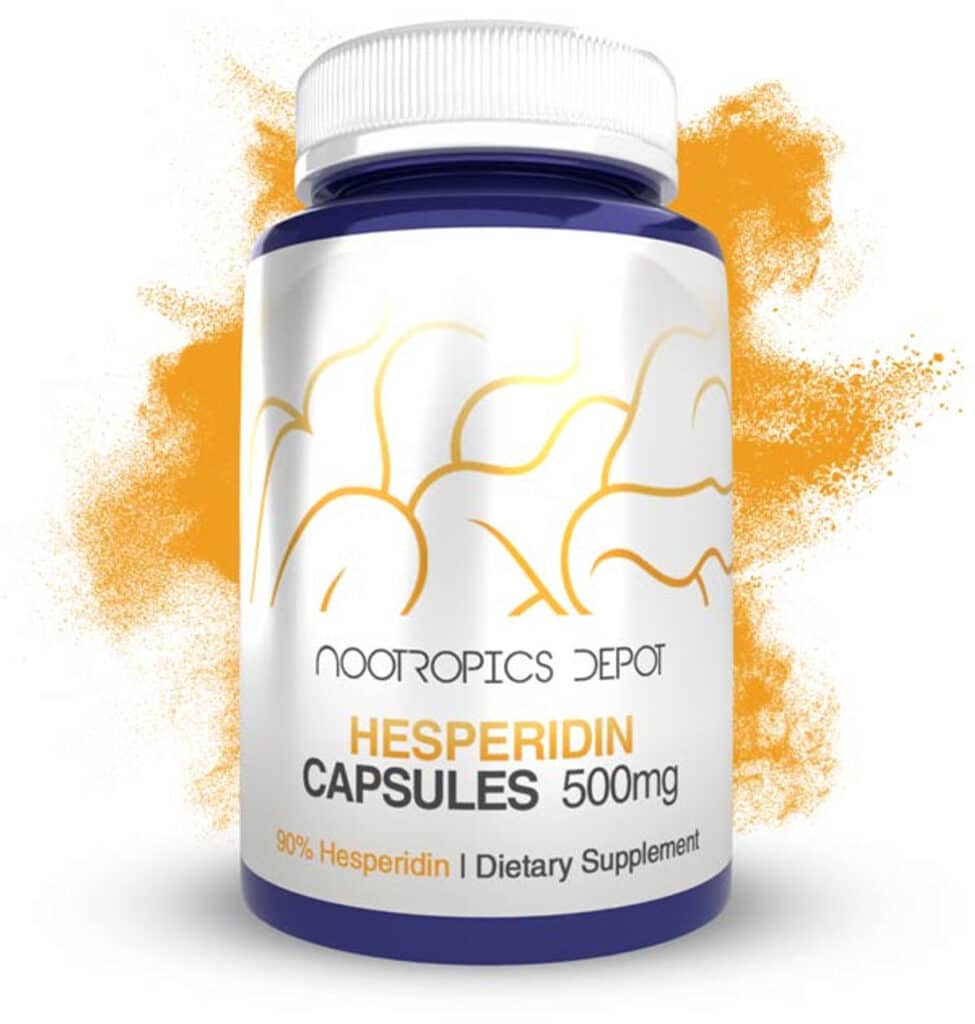
You’ve likely heard of Vitamin C’s benefits, but do you know about Hesperidin, its lesser-known partner found in citrus fruits? It’s time you discovered this potent bioflavonoid. We’ll delve into its origins, health benefits, potential side effects, and dosage guidelines. We’re also exploring its role in dietary supplements and food products. By the end, you’ll know why Hesperidin’s worth your attention.
Understanding Hesperidin: Origin and Properties
You’re about to delve into the understanding of hesperidin, its origin, and its unique properties. As a flavonoid, hesperidin belongs to a class of plant and fungus secondary metabolites. It’s predominantly found in citrus fruits, specifically in the white inner layer of the peel, called the mesocarp or albedo.
Interestingly, hesperidin was first isolated in 1828, making it one of the earliest identified flavonoids. It’s named after “Hesperides,” a term from Greek mythology referring to nymphs who tended a blissful garden in the far western corner of the world. The name is fitting, as hesperidin has been found to bear potent antioxidant properties.
Scientific research has shown that this flavonoid neutralizes harmful free radicals in your body, thereby reducing oxidative stress. This action is crucial in preventing cellular damage, which can lead to chronic diseases. Furthermore, hesperidin showcases anti-inflammatory properties, aiding in reducing inflammation and potentially offering relief from related conditions.
Exploring the Health Benefits of Hesperidin
Now, let’s delve into the health benefits of hesperidin. This flavonoid isn’t just vital for plant health; it’s got a wide range of potential applications for your wellbeing too. From cardiovascular health to its neuroprotective properties, hesperidin’s benefits span various aspects of human health.
Hesperidin and Cardiovascular Health
You’ll find that hesperidin can play a significant role in cardiovascular health. Hesperidin exhibits cardioprotective properties with potential benefits for heart health. Research indicates it helps to maintain blood pressure within a healthy range. This is achieved through the flavonoid’s action on blood vessels, primarily by promoting vasodilation, which in turn reduces the resistance to blood flow and aids in preventing hypertension. Further, hesperidin’s antioxidant properties help protect the heart and blood vessels from oxidative stress, a key contributor to cardiovascular disease. It’s noteworthy to understand that hesperidin doesn’t replace a healthy lifestyle but can complement it. Thus, incorporating hesperidin can be a promising approach for enhancing cardiovascular health.
Potential Neuroprotective Properties
Hesperidin’s antioxidative characteristics contribute to its neuroprotective effect. It’s been shown to diminish oxidative stress, a contributing factor in neurodegenerative diseases. By mitigating the damaging effects of oxidative stress, hesperidin can support the brain’s health, potentially slowing the progression of diseases like Alzheimer’s and Parkinson’s.
Moreover, hesperidin’s neuroprotective role extends to cognition. Fortifying the brain’s neuronal structure can help sustain cognitive functions. It aids in preserving and improving memory and learning abilities, which are heavily impacted by neurodegenerative diseases.
Benefits for Diabetic Retinopathy
It might also play a role in managing diabetic retinopathy, a common complication of diabetes. Hesperidin, found in abundance in citrus, could potentially benefit those suffering from this condition. It’s believed to improve antioxidant status, a critical factor in effectively managing diabetes.
Why does this matter? Unregulated blood sugar levels in diabetes can cause oxidative stress, damaging the retina and leading to diabetic retinopathy. With its potent antioxidant properties, Hesperidin might help combat this oxidative stress, thereby protecting the retina. However, it’s essential to remember that while the potential of hesperidin looks promising, more research is needed to validate these findings and explore optimal dosages. It’s always recommended to consult a healthcare provider before starting any new supplement regimen.
Hesperidin’s Anti-inflammatory Impact
Beyond its potential for managing diabetic retinopathy, there’s also evidence that this supplement could have a significant anti-inflammatory impact on your body. It’s been found to inhibit the production of pro-inflammatory cytokines, thus limiting inflammation at the cellular level. Moreover, it regulates the functions of immune cells, preventing overreaction that often leads to inflammation. Hesperidin’s uses extend to managing conditions such as arthritis, where inflammation is prevalent. By integrating this bioflavonoid into your diet, you can leverage its anti-inflammatory benefits. This, in turn, could help you maintain overall health and potentially prevent certain inflammatory diseases.
Role in Metabolic Disorders
In the realm of metabolic disorders, your diet can play a crucial role, and incorporating citrus bioflavonoids might be the game changer you’re looking for. It’s been shown to potentially lower cholesterol levels, an essential factor in cardiovascular health. Additionally, it holds promise in treating liver disease, specifically fatty liver, a common metabolic disorder. By reducing lipid accumulation, it may inhibit the progression of the disease. It’s crucial to understand that while hesperidin has potential, it shouldn’t be the sole means of managing metabolic disorders. Always consult with a healthcare provider before incorporating it into your regimen.
Potential Side Effects of Hesperidin Consumption
While most people don’t experience any adverse effects, it’s important to know that hesperidin might cause some digestive issues for you. Complaints of stomach pain, diarrhea, and nausea are among the reported side effects, though they’re relatively uncommon. Observing your body’s responses and adjusting your intake is crucial.
Beyond digestive complications, hesperidin may also affect blood clotting. If you’re predisposed to bleeding disorders, you should exercise caution with this supplement. Hesperidin’s potential to slow blood clotting might increase your risk of bruising or bleeding. If you’re undergoing surgery, it’s recommended to stop taking hesperidin supplements at least two weeks prior.
If you’re pregnant or breastfeeding, the safety of hesperidin is still uncertain. Although it’s found naturally in citrus fruits, the concentrated doses in supplements may have unintended consequences. Until more research is conducted, avoiding hesperidin supplements during pregnancy and breastfeeding is advisable.
Necessary Precautions and Interactions to Consider
As you delve deeper into the world of hesperidin, it’s crucial to understand the necessary precautions and potential interactions associated with this compound. Firstly, always consult a healthcare professional before starting any new supplement regimen. They will help you determine the appropriate dosage for your specific needs.
Hesperidin may interact with certain medications, such as anticoagulants and antiplatelets, potentially increasing the risk of bleeding. If you’re on blood thinners, discussing your hesperidin intake with your doctor is crucial. Additionally, if you’re preparing for surgery, you might need to stop taking hesperidin at least two weeks before reduce the risk of excessive bleeding.
While hesperidin has numerous health benefits, it’s not a substitute for a balanced diet and regular exercise. Overconsumption can lead to side effects like abdominal pain or diarrhea. Therefore, sticking to the recommended dosage is key.
Be mindful of allergic reactions as well. If you experience symptoms like rash, itching, swelling, severe dizziness, or trouble breathing, seek medical attention immediately.
Understanding these precautions and potential interactions will help you make an informed decision about incorporating hesperidin into your wellness routine.
Absorption and Bioavailability: How Hesperidin Works
Hesperidin is not readily absorbed in its natural state. In fact, it’s metabolized by the gut microbiota into a more absorbable form called hesperetin.
Hesperidin’s bioavailability, however, depends on several factors. It’s often taken in capsule or powder form for enhanced absorption. For instance, encapsulated hesperidin is designed for controlled release, allowing for optimal absorption throughout the day. On the other hand, powders offer flexibility in dosage and can be mixed with other substances to enhance bioavailability.
The absorption of hesperidin also varies from person to person, influenced by factors such as individual gut microbiota composition and overall health status. It’s important to note that hesperidin’s absorption is enhanced when taken with a meal, specifically those containing fats, which can increase its solubility and transport across the intestinal barrier.
Guidelines for Effective Hesperidin Dosage
While it’s clear that this compound can boost your health, it’s equally important to understand how much you should consume daily to reap its benefits. Acknowledging the potency of hesperidin, it’s crucial to nail down the appropriate dosage for optimal health benefits.
The standard dosage of hesperidin varies, largely depending on the uses and desired benefits. Aim for 100 to 200 mg per day for general wellness and antioxidant support. If you’re targeting vein health or seeking anti-inflammatory effects, consider a higher dosage, typically around 500 mg. It’s also worth noting that hesperidin is often taken in combination with diosmin for circulatory support.
However, like many supplements, there isn’t a one-size-fits-all dosage for hesperidin. Factors like age, health status, and other medical conditions can influence the optimal amount. Therefore, it’s always wise to consult a healthcare professional before starting any new supplement regimen.
Conclusion
In conclusion, hesperidin, a flavonoid found in citrus fruits, offers many health benefits. However, it’s not without potential side effects. Understanding its interactions, precautions, and how it’s absorbed is vital. Its role in dietary supplements and food products is increasingly noted. Remember, correct dosage is crucial to reap its benefits. Always consult a health professional before starting any supplement regimen. Stay informed, stay healthy.
